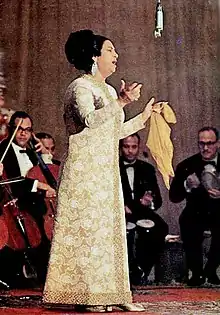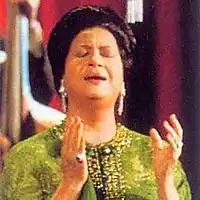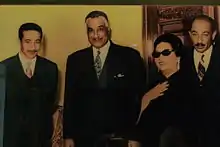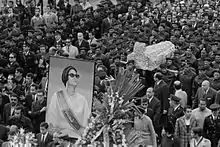Umm Kulthum
Umm Kulthum Ibrahim es-Sayyid el-Beltagi (4 May 1904 – 3 February 1975) was an Egyptian singer, songwriter and actress in the Arab world of the 20th century. She is seen as a national icon of Egypt. She became known as "The Voice of Egypt"[1] and "Egypt's Fourth Pyramid".[2] Kulthum was given the honorific title "Kawkab el-charq." It means 'Planet of the East'.[3] She performed over 320 songs. These include "al-atlal". It was ranked one of the top 100 songs of the 20th century.[4] Her funeral was attended by four million people in the streets of Cairo.[5]
Umm Kulthum أم كلثوم | |
|---|---|
 | |
| Background information | |
| Birth name | Umm-kulthum Ibrahim es-Sayyid el-Beltagi |
| Also known as | Oum Kalthoum, Om Kalsoum, Om Koulsum, Om Kalthoum, Oumme Kalsoum, Umm Kolthoum, Om Koultoum, Ummi Kultsum, Ummi Kaltsum, Umi Kulsum, Umi Kalsum |
| Born | 4 May 1904 Tamay Ez-Zahayra, El Senbellawein, Dakahlia Governorate, Khedivate of Egypt, Ottoman Empire |
| Died | 3 February 1975 (aged 76) Cairo, Egypt |
| Genres | Arabic classical music |
| Occupation(s) | Singer, actress |
| Years active | c. 1924–1973 |
| Labels | EMI Arabia |
Biography

Umm Kulthum's exact date of birth is not known. According to birth records of the Daqahliyaa Province, it is thought to be on 4 May 1904, .[1] She had a sister and a brother. Her sister was named Sayyida. She was ten years older than Umm. Her brother was named Khalid. He was one year older than Umm.[1] Umm Kulthum came from a very humble background. Her mother, Fatma al-maliji, took care of the children and the house. Her father - Al-Shaykh Ibrahim Al-Sayyid Al-Baltaji- was a local Imam in the village of Tammay al-Zahayra.[1] When she was five years old, her father sent her to a religious school - al-Kuttab- to learn to recite the Qur'an. Umm Kalthoum's father Al-Baltaji, used to sing religious songs in weddings and ceremonies - such as the Prophet's birth and the Islamic New Year- in neighboring villages as a way of generating income.[1] Commemorating such events by reciting the Qur'an was part and parcel of the peasant society where Umm Kulthum grew in. To listen to a good Qur'anic chanter was "one of the few means at the "fallah's" (peasant) disposal which was not censored, punished, taxed or confiscated, unlike everything else he owned".[1] Al-Baltaji first discovered Umm Kulthum's voice when she recited the songs he taught to his son Khalid.[6] Afterwards, Umm Kulthum started tagging along her father's trips and became part of the ensemble. In the beginning, and due to the conservative society where they were living, her father dressed her up like a boy while preforming together on stage. Her father had to accept the idea of his daughter singing in front of an audience because the family needed the money.[5] Umm Kulthum recounted: "at first, I was like a parrot. What my father sang, I sang" and shortly after became known as "the little girl with the powerful voice".[5] She moved with her family to Cairo in the 1920's in pursuit of a better life.[6] With their move to Cairo, they noticed that religious songs were not cherished as before while nightclubs and cabarets were becoming more and more popular.[5] Umm Kulthum noted: "when I first came to Cairo, religious songs had declined in popularity. British soldiers crowded the nightclubs that grew up to accommodate them. ... Singers held a low-esteem but the most famous ones had great influence even with members of the Government".[5]
Professional Career
When Umm Kulthum first moved to Cairo, she continued singing religious songs in concerts and celebrations. This type of music was not popular. Afterwards, she started singing poems "qasa'id" as well as "muwashahat" and eventually moved to love songs and "mawawil". Al-Kashkul Egyptian magazine noted this shift in her music; which went from praising the Prophet to praising the lover and attributed it to "the desire to satisfy the people, to stoop all to all of their passions and whims!".[1] Umm Kulthum gave a concert on the first Thursday of each month among other celebrations and ceremonies. Odeon Records noticed her popularity rising and first approached with a job offer in 1923 and her initial recordings were written by Ahmad Sabri al-Najridi.[1] Her records sold everywhere and with her recordings the company made large profits.[1] In fact, many of the people who bought her recordings were her past rural audience whom she grew popular among, but also Egyptians of all walks of life waited in line to buy her recordings.[5] What facilitated her debut as a professional singer was the mentoring she received on the hands of the poet Ahmad Rami.[7] Slowly but steadily, she became acquainted with Egypt's elites and politicians and became an esteemed guest at their residences. This increased her success, power and position in the Egyptian society. It is said that the year 1926 was the turning point which transformed Umm Kulthum from a famous singer to an illuminous star in Egypt.[1] This pivotal moment was aided by her decision to employ a professional orchestra rather than her relative instrument players..[1] Her success drew more and more critics and enemies but this only heightened her popularity. The 1940's were deemed the "golden age" of Umm Kulthum. She reached the height of her vocal powers and becoming a mature singer.[1] Moreover, Umm Kulthum started experimenting with new "qasa'id" and populist songs. Her Thursday concerts were not only anticipated in Egypt but all throughout the Arab world. Listeners would tune in on the radio and enjoy a night of enchantment "tarab".
Political Value

Umm Kulthum is seen as a national icon of Egypt. She defined the Arabic music all over North Africa and the Middle East in the 20th century.[3] She became known as “The Voice of Egypt”,[1] “Star of the East” [3]and “Egypt’s Fourth Pyramid”.[2] Her music spans a time period of around fifty years (1924-1973). Big cultural and political shifts were experienced in North Africa and the Middle East. Her music also evolved with the changing political dynamics in Egypt. Umm Kulthum herself was thereby active in challenging the position of women in music and in the country. She contributed to the forming of a national identity of the Egyptians after post-colonial rule.[3]
Challenging the position of women
Umm Kulthum challenged the position of women within Egyptian society. She started her professional singing when women performing was a taboo.[3] During her whole career, she undermined traditional gender norms by making her own business deals. She often sang to an audience mostly filled by men.[8][3] She was president of the Musicians Union for seven years, despite being opposed by many because of her gender.[3] Umm Kulthum also resisted to give up her singing career for a family life. She had two unconventional marriages. Her first marriage ended within days, while her second marriage – at the age of 50 – was with a younger man with children from an ex-wife.[8]
Umm Kulthum’s music often covered topics regarding longing, love, loss and romance. However, her songs also covered controversial topics. With her music, she pushed for gender boundaries and dictated women’s desires, sexuality and political thought.[3]
Contributing to the vision of Pan-Arabism
Umm Kulthum contributed to the shaping of a pan-Arabic identity in anti-colonial movements within North Africa and the Middle East. She became a symbol of nationalism in Egypt as a supporter of the Nasserist Revolution. The line of Umm Kulthum’s love song “al-Atlal”: “Give me my freedom, release my hands” became a famous slogan against colonial rule and Israeli occupation.[3]
Her support for Gamal Abdel Nasser was a mutually beneficial relationship. Nasser nationalised radio, music and all forms of public media. He was aware of the unifying power of Umm Kulthum's music in creating the vision of Pan-Arabism. He granted her an entire radio station. Umm Kulthum had the honor of performing before and after his public speeches.[3]
Remembrance

Umm Kulthum died on 3 February 1975, at the age of 76.[9] She experienced several health problems during most of her lifetime, for which her problems with her eyes forced her to wear sunglasses. Later, this became her signature mark as an artist. Her death led to an outburst of hysterical grief and millions of people lined the streets of Cairo for her funeral.[5][10]
Decades after her death, Umm Kulthum was one of the best-selling singers of the Arab world. The Kawkab al-Sharq Museum in Cairo was established by the Egyptian government in 2001 to honor and celebrate her life and accomplishments.[10]
At the Winter in Tantora festival in Al-‘Ula in January 2019, Umm Kulthum appeared as a hologram during a live concert.[11]
References
- Danielson, Virginia (1997). The voice of Egypt: Umm Kulthūm, Arabic song, and Egyptian society in the twentieth century ·. The University of Chicago Press. pp. 1–151. ISBN 978-0-226-13612-7.
- Caballero, Sonia (7 February 2021). "Umm Kulthum, "Egypt's fourth pyramid"". Al Fusaic. Retrieved 26 April 2022.
- Fawzy, Mary (27 December 2021). "The inescapable Umm Kulthum". NEW FRAME. Archived from the original on 29 June 2022. Retrieved 26 April 2022.
- "أم كلثوم". Al Jazeera. 12 January 2014. Retrieved 26 April 2022.
- ام كلثوم وثائقي | بصوت عمر الشريف Documentary: Umm Kulthum, A Voice Like Egypt (1996), retrieved 22 April 2022
- الحنفي, رتيبة (1994). معجزة الغناء العربي. القاهرة: دار الشروق. p. 35.
- Danielson, Virginia (1991). Shaping tradition in Arabic song: The career and repertory of Umm Kulthum. Illinois, Chicago: Urbana. p. 106.
- Faber, Tom (28 February 2020). "'She exists out of time': Umm Kulthūm, Arab music's eternal star". The Guardian. Retrieved 26 April 2022.
- "Egyptians Throng Funeral of Um Kalthoum, the Arab's Acclaimed Singer". The New York Times. 6 February 1975. Retrieved 26 April 2022.
- Danielson, Virginia L. (30 January 2022). "Umm Kulthum". Encyclopædia Britannica. Retrieved 26 April 2022.
- Al-Ghalib, Essam (27 January 2019). "Umm Kulthum returns virtually for Tantora show in Al-Ula". Arab News. Retrieved 26 April 2022.
Other websites
 Media related to Umm Kulthum at Wikimedia Commons
Media related to Umm Kulthum at Wikimedia Commons- Biography at AllMusic
- The Star of the East at Østfold College, Halden, Norway from almashriq.hiof.no